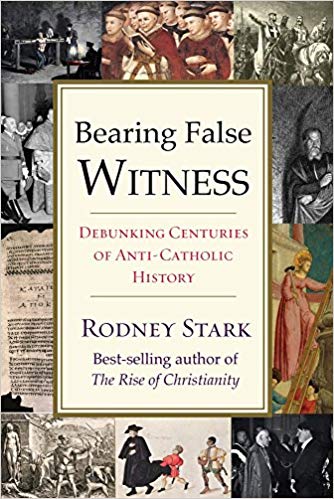Doctrines
agreed upon by all develop, too.
- The Divinity or Godhood of Christ was only finalized in 325,
- and the full doctrine of the Trinity in 381.
- The dogma of the Two Natures of Christ (God and Man) was proclaimed in 451.
These decisions of General Councils of the Church
were in response to challenging heresies. Why should Protestants accept these authoritative verdicts, but reject
similar proclamations on Church government, the Eucharist, Mary, Purgatory, etc.?
Although understanding increases,
the essential elements of doctrines exist from the beginning. Today’s Church shouldn’t be expected to look like the primitive Church if it is a living, vibrant, spiritual organism. But even the early Church looks like a small “Catholic tree.” It doesn’t look like a Protestant “statue,” doomed to be increasingly corrupted by an encroaching, “diabolical” Catholicism, as is imagined by millions of Protestants unacquainted with the early Church and the oldest source materials after the New Testament, such as the writings of St. Ignatius of Antioch (d.c. 110) and St. Clement of Rome (d.c.101).
One thing at least is certain; whatever history teaches . . . at least the Christianity of history is not Protestantism. If ever there were a safe truth, it is this. And Protestantism . . . as a whole, feels it, and has felt it. This is shown in the determination . . . of dispensing with historical Christianity altogether, and of forming a Christianity from the Bible alone . . . To be deep in history is to cease to be a Protestant.
John Henry Cardinal Newman (1801-1890),
Essay on the Development of Christian Doctrine
Protestantism is inconsistent in its selective espousal of Christian beliefs. The so-called “Catholic distinctives” were merely cast off at the time of the Protestant Revolt in the 16th century –
basically due to prejudice and ignorance. Protestantism ever since has had to either distort, ignore, or be embarrassed by the facts of early Christian history which, again and again, are found to be much more in conjunction with Catholicism. Protestant anti-Catholic apologists are notorious for searching for quotes by Church Fathers which appear to support their presuppositions, while bypassing those (often by the same Father) which clearly suggest the Catholic outlook. I did this myself in the year before I was convinced of the truth of Catholicism.
Newman states, in summary:
If it be true that the principles of the later Church are the same as those of the earlier, then, whatever are the variations of belief between the two periods, the later in reality agrees more than it differs with the earlier, for principles are responsible for doctrines. Hence they who assert that the modern Roman system is the corruption of primitive theology are forced to discover some difference of principle between the one and the other; for instance, that the right of private judgment was secured to the early Church and has been lost to the later, or again, that the later Church rationalizes and the earlier went by faith.
(Ibid., ch. 7, section 6: conclusion)
This is true whether the theological considerations are those agreed upon by all, such as the Divinity of Christ, the Two Natures of Christ, the Trinity, the Holy Spirit, Original Sin, and the Canon of Scripture, or those denied by Protestants, such as the Marian dogmas, Purgatory, the papacy, the Real Presence of Christ in the Eucharist, the Communion of Saints, priestly absolution, baptismal regeneration, the Sacrifice of the Mass, etc.
If anything must be described, then, as a corruption of primitive, pure Christianity, it is Protestantism, not Catholicism, since it introduced
a radically new mode of Christian authority which was a 180-degree departure from the established Christian Tradition: that of subjective, private judgment, tied in with the unbiblical, unhistorical, and unreasonable notion of “Scripture Alone.” Protestantism is much more of a corruption, if that word is defined as an essential change of direction or philosophy of an institution or a set of beliefs (in this case theological and spiritual).
One might say that an automobile was “corrupt” if the owner decided that it ran better with no muffler, no shocks, no air or fuel filters, half of its spark plugs, watered-down gas, no rear brakes, one headlight, no heat, three quarts low on oil, with half of its radiator coolant, etc. Corruption can consist of “subtraction” as well as “addition.”
Protestantism’s charges against Catholicism, closely scrutinized, only come back to incriminate itself.
By and large, Protestantism merely asserts “sola Scriptura” without much consideration of the seriously-flawed implications of the same, and judges all doctrines accordingly. Therefore, those which are deemed to be either outright unbiblical or insufficiently grounded in Scripture to be authoritative, are jettisoned: the Marian doctrines, Purgatory, Penance, the papacy, etc. Apart from the question of Tradition as a legitimate carrier (alongside and in harmony with Scripture) of Christian belief,
much more biblical support can be found in Scripture for these “Catholic” doctrines than Protestants suppose.
One simply needs to become familiar with Catholic biblical apologetic arguments. The idea of doctrinal development is a key, in any case, for understanding why the Catholic Church often appears on the surface as fundamentally different than the early Church.
Thoughtful Protestants owe it to themselves and intellectual honesty to ponder this indispensable notion before lashing out at the allegedly “unbiblical excesses” of Catholicism.
Development of Doctrine: A Corruption of Biblical Teaching?


